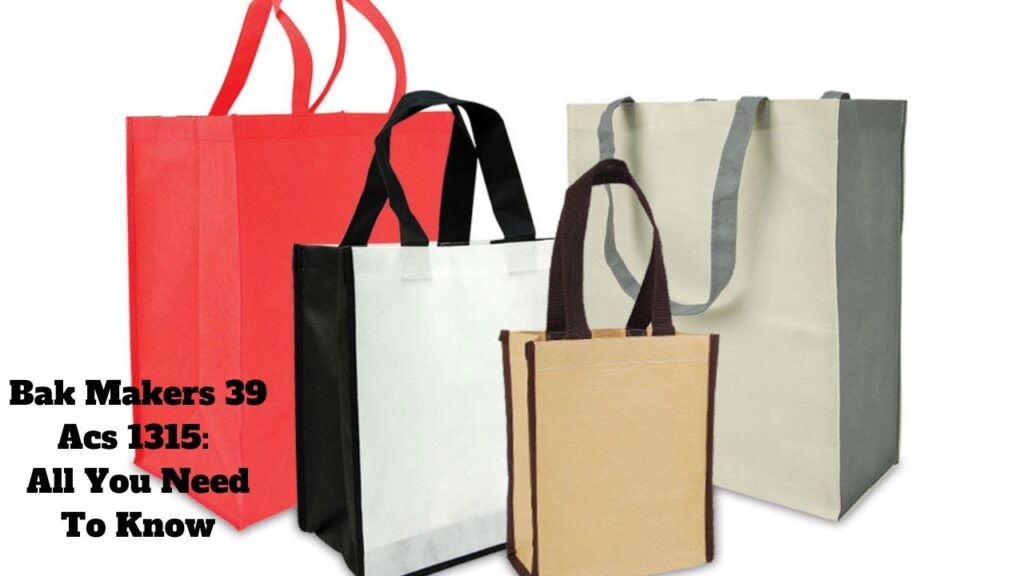If you’re a student at Sacramento State University (Sac State) considering enrolling in Bak Makers 39 Acs 1315 with Professor Bak Makers, you’re likely wondering what this course entails and what to expect. ACS 1315, also known as “Principles of Biochemical Techniques,” is a fundamental course for students pursuing degrees in biochemistry, chemistry, or related fields. This article will provide an in-depth look at the course, Professor Bak Makers’ teaching style, and how you can succeed in this rigorous but rewarding class.
Who is Bak Makers?
Background and Academic Credentials
Professor Bak Makers is a distinguished faculty member at Sacramento State University Bak Makers 39 Acs 1315, known for his expertise in biochemistry and molecular biology. With a strong academic background, including a Ph.D. in Biochemistry from a prestigious university, Professor Makers brings a wealth of knowledge and experience to the classroom. His research focuses on [Specific Research Areas], contributing significantly to the field of biochemistry.
Teaching Philosophy
Professor Makers’ teaching philosophy emphasizes the integration of theory with practical application. He believes in fostering a deep understanding of biochemical concepts through hands-on laboratory experiences and critical thinking Bak Makers 39 Acs 1315. His approach is designed to challenge students while providing the support they need to grasp complex ideas.
Overview of ACS 1315
What is ACS 1315?
Bak Makers 39 Acs 1315, “Principles of Biochemical Techniques,” is a foundational course that introduces students to the essential techniques used in biochemistry laboratories. This course is crucial for students aiming to build a career in biochemistry, molecular biology, or related fields, as it covers the principles and methodologies that form the backbone of experimental work in these disciplines.
Key Topics Covered
- Spectroscopy Techniques: Understanding how to use UV-Vis, IR, and NMR spectroscopy to analyze biochemical compounds.
- Chromatography: Techniques such as HPLC and GC for separating and analyzing complex mixtures.
- Electrophoresis: Gel electrophoresis and its applications in protein and nucleic acid analysis.
- Enzyme Kinetics: Studying the rates of enzyme-catalyzed reactions and understanding enzyme inhibition.
- Molecular Cloning: Basic techniques in DNA manipulation and cloning.
Course Structure and Syllabus
The ACS 1315 course is structured to combine lectures with laboratory sessions, allowing students to apply theoretical knowledge in a practical setting. The syllabus typically includes:
- Lectures: Covering the theoretical aspects of biochemical techniques, with a focus on understanding the principles behind each method.
- Laboratory Sessions: Hands-on experiments where students perform techniques discussed in lectures, with an emphasis on accurate data collection and analysis.
- Assignments and Reports: Regular assignments to reinforce learning, along with detailed lab reports that require critical analysis of experimental results.
- Exams: Midterm and final exams designed to test both theoretical knowledge and practical understanding.
Also Read: What To Expect In Brian Baker Sac State Classes
Expectations and Workload
ACS 1315 is known for its rigorous workload, which includes extensive reading, preparation for lab sessions, and detailed reporting. Students should be prepared to dedicate significant time to studying the course material, as well as completing assignments and lab work.
Professor Bak Makers’ Teaching Style
Interactive and Engaging Lectures
Professor Makers is known for his dynamic and interactive lecture style. He encourages student participation and often uses real-world examples to illustrate complex biochemical concepts. His lectures are designed to be engaging, with opportunities for students to ask questions and clarify doubts.
Hands-On Learning in the Laboratory
A key component of ACS 1315 under Professor Makers is the emphasis on hands-on learning. He believes that the best way to understand biochemical techniques is through direct experience. In the lab, students are encouraged to take initiative, troubleshoot problems, and think critically about their experiments.
Supportive Learning Environment
While the course is challenging, Professor Makers is committed to creating a supportive environment for his students. He is approachable and willing to provide extra help during office hours or by appointment. His goal is to ensure that every student has the opportunity to succeed, regardless of their initial comfort level with the material.
How to Succeed in ACS 1315 with Bak Makers
Preparation is Key
Success in ACS 1315 begins with thorough preparation. Students should come to each lecture and lab session having completed the required readings and reviewed the previous material. This will allow you to actively participate in discussions and make the most of your lab time.
Stay Organized
With the detailed nature of the lab work and the complexity of the topics covered, staying organized is crucial. Keep a detailed lab notebook, track assignment deadlines, and manage your time effectively. This will help you stay on top of the workload and reduce stress.
Utilize Office Hours
Professor Makers is known for being approachable and supportive, so don’t hesitate to seek help if you’re struggling with any aspect of the course. Attending office hours can provide valuable one-on-one time to address specific challenges or deepen your understanding of the material.
Collaborate with Peers
Group work and collaboration are often encouraged in ACS 1315. Working with your peers can provide new perspectives and help clarify complex concepts. Additionally, discussing lab results with classmates can enhance your understanding and improve the quality of your reports.
Focus on Lab Reports
Lab reports are a significant part of your grade in ACS 1315. Take the time to thoroughly analyze your data and present your findings clearly. Pay attention to detail, as accuracy and precision are crucial in biochemical techniques.
Student Feedback on ACS 1315 with Bak Makers
Positive Experiences
Students who have taken ACS 1315 with Professor Makers often praise the course for its thoroughness and the practical skills it imparts. Many appreciate the combination of rigorous academic content with hands-on lab work, which prepares them well for future courses and careers in biochemistry.
Constructive Criticism
While the course is generally well-received, some students find the workload challenging, particularly the demands of the lab sessions and the detailed reporting required. However, most agree that the effort is worthwhile and that Professor Makers provides the support needed to succeed.
Success Stories
Several students have credited ACS 1315 with sparking their interest in research or helping them secure internships and job placements in the field. The skills and knowledge gained in this course are directly applicable to a wide range of professional opportunities, making it a valuable part of their academic journey.
Also Read: Baker Funeral Home Obituaries Moultrie Georgia: Complete Review
Conclusion
ACS 1315 with Professor Bak Makers at Sac State is a demanding but rewarding course that equips students with essential biochemical techniques and critical thinking skills. By staying organized, actively engaging in lectures and labs, and utilizing available resources, students can excel in this course and lay a strong foundation for their future careers in biochemistry. Whether you’re pursuing a degree in biochemistry, chemistry, or a related field, ACS 1315 is a vital part of your academic journey, offering both the knowledge and hands-on experience needed for success.
FAQs
What is the focus of ACS 1315 with Bak Makers?
ACS 1315 focuses on the principles and techniques used in biochemistry laboratories, including spectroscopy, chromatography, electrophoresis, enzyme kinetics, and molecular cloning.
How can I prepare for the workload in ACS 1315?
Stay organized, complete all readings and assignments on time, and actively participate in both lectures and lab sessions. Utilize office hours for additional support.
What are the lab sessions like in ACS 1315?
Lab sessions are hands-on and designed to reinforce the theoretical concepts covered in lectures. Students are expected to perform experiments, collect and analyze data, and write detailed lab reports.
How does Professor Bak Makers support students?
Professor Makers is approachable and offers support through office hours, email communication, and after-class discussions. He is committed to helping all students succeed in his course.
Is ACS 1315 a difficult course?
ACS 1315 is challenging due to its rigorous content and workload, but with proper preparation and time management, students can succeed and gain valuable skills.
What skills will I gain from ACS 1315?
Students will develop a strong foundation in biochemical techniques, critical thinking, data analysis, and scientific reporting, all of which are essential for careers in biochemistry and related fields.



